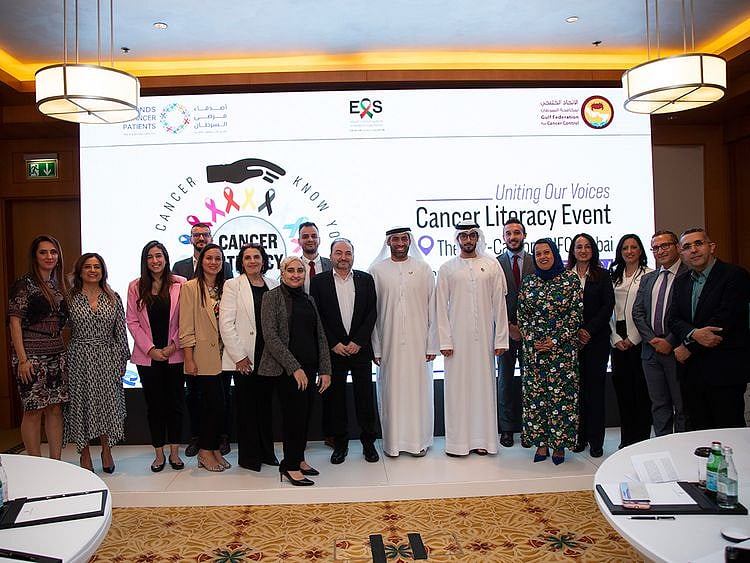Cancer literacy is key to managing the disease in the region, say experts
Pfizer’s Uniting Our Voices event highlights the importance of bolstering cancer awareness

Strengthening cancer awareness activities aimed at primary prevention and bolstering national cancer registries in each GCC country is key to the effective management of the disease in the region, said Prof. Humaid Al Shamsi, President of Emirates Oncology Society, and Director of Oncology Services – VPS Health. Speaking at the Uniting Our Voices event organised by Pfizer in Dubai this week, Prof. Al Shamsi pointed out that the age-standardised incidence rate of cancer in the GCC is higher than the global average, and that mass education and campaigns on cancer screening and early detection are the most important regulatory action that needs to be taken by authorities in the region.
He said barriers to effective early cancer screening in the UAE and the wider region need to be broken down by addressing target audiences at educational institutions and through the media. “By 2040, cancer incidence among the GCC nationals is expected to rise by 164 per cent for all ages, and by 465 per cent in individuals over the age of 70 years. Tobacco and obesity are the biggest risk factors in the region, but we need to do more about cancer awareness.”
Cancer is the third-leading cause of death in the UAE, after cardiovascular diseases and trauma, but although cancer care in the UAE has evolved significantly over the past 40 years, cancer literacy is relatively low in the country, particularly among the general population. Early cancer detection and screening are still evolving in the UAE, and experts like Al Shamsi have pointed out that the lack of a national screening programme and the need to address barriers to screening and consider less invasive screening methods that are likely to be more acceptable to the UAE population.
While various studies have shown that only a small percentage of people in the UAE are aware of the major symptoms of cancer or the importance of early detection, there are cultural and social barriers that prevent people from seeking information about cancer or discussing it openly. “We have a lot of taboos about talking about cancer, and we need to help people get around these and focus on awareness regarding that,” said Dr Rita Sakr, Consultant Breast Oncoplastic Surgeon and Director of Breast Clinic at King’s College Hospital Dubai. “As doctors, we need to make sure that the awareness messages get to our patients. We need to be sure that we are asking every patient about their family history, that they have instructions about self-examination for example, regarding breast cancer and remind them about the right age for screening.”
She also said it is important to get those messages to a larger number of young students, starting with schools and universities. “It's very important to educate people from the youngest possible ages about the risk factors so that they will become adults with awareness about screening and other ways of managing cancer.”
The UAE government and various organisations are taking steps to increase cancer literacy in the country. For example, the Abu Dhabi Health Services Company (SEHA) and the Dubai Health Authority (DHA) have launched several awareness campaigns to educate people about the importance of cancer screening and early detection encouraging people to adopt healthy lifestyles. However, experts are of the view that still more needs to be done to strengthen these efforts and provide improved cancer literacy and promote early detection and prevention of the disease. Dr Hassan Ghazal, Medical Oncologist at King’s College Hospital Dubai, believes the creation of formal advocacy groups and survivor groups is essential for supporting cancer patients. “At the hospital level, we tried to form a small patient advocacy group, but this is something lacking at the national level. But it’s gaining some traction because other hospitals are following our lead and doing it as well,” Dr Ghazal said.
“I just wish we have a broader advocacy group where survivors or patients can go and talk to each other. No matter how much we as physicians talk to a new patient, there is nothing more powerful than that patient talking to another patient who went through the same.”
Dr Dina Hamza, Senior Clinical Oncologist at Dubai Hospital, was of the opinion that patients should not wait for symptoms to appear to get a screening done, especially for three types of cancer. “Screening is approved worldwide for three cancers: breast cancer, cervix cancer and colon cancer,” she said.
“This does not mean these are the cancers we can screen for, but these are the cancers we must screen for. Screening for these three should be done proactively, and we should not wait for symptoms.”
Cancer literacy is a way of describing the skills we need to look after our health, Dr Nadine Tarcha, Pfizer Gulf Medical Lead, explained, and that it plays an important role in how we can understand and act on health information. “Low health literacy can affect anyone and many people find health information difficult or confusing. Pfizer has taken an important role in promoting clear health communication,” she said.
“We support healthcare professionals and patients with resources and tools to encourage better health conversations that may help improve outcomes for patients. Each day we continue to build trusted, equitable and bidirectional relationships with cancer patients and patient advocacy organisations to make sure patient voices are heard and amplified as we work to discover, develop, and deliver breakthrough cancer treatments.”
Sign up for the Daily Briefing
Get the latest news and updates straight to your inbox
Network Links
GN StoreDownload our app
© Al Nisr Publishing LLC 2025. All rights reserved.